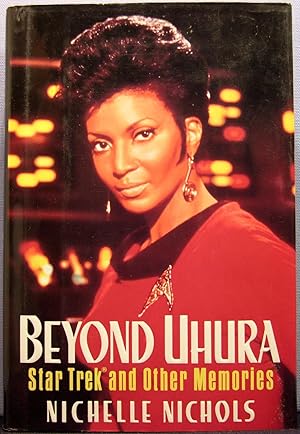Nichelle Nichols begins with her life as Grace Nichols, growing up and taking dance lessons. Originally interested in ballet, she became interested in Afro-Cuban dance, which she claimed saved her from the glamorous, but ultimately torturous life of ballet. She also writes very frankly about the racism and sexism she dealt with early on, from numerous times being rejected at a hotel which had already been reserved for her due to her race, to an experience being blackmailed for sexual favors. It is certainly not something that someone with my limited experience can do justice. Nichelle even covers her experiences as a single mother who had moved back in with her parents. Her willingness to write about these things could also be good for opening future conversations for young and/or single mothers, especially as she recalls a slip in parenting, which would later become almost a running joke between her and her son.
Of course, she writes about her experiences playing Uhura, but also those leading up to it, including her work in The Lieutenant, which was actually her first time working with Gene Roddenberry. With Star Trek, she would continue to encounter racism in the form of workers not giving her the fan mail addressed to her, and even, after Grace Lee Whitney left, being told that she should have been the one to leave, and not Grace. However, she also notes the positive aspects of her work, even being told by Martin Luther King Jr. about the importance of her role.
Unfortunately, her role was also diminished in many ways, with lines and even scripts being altered or cut. This is attributed to people both on and off the set, considering the racist ideals that existed at the time, which were not ready to accept the more enlightened ideals of the fictional twenty-third century.
Uhura, for me, was actually one of my first exposures to a strong and feminine character. A lot of times growing up, and even today, in the media and even in real life women are often given a choice. "You can be strong or you can be feminine, but you can't be both." But Uhura exists as a contradiction to that. As the communications officer, she is a vital role on the ship, especially when you consider that without Uhura, the Enterprise might be blown up before anyone has a chance to explain things to someone who assumes they are hostile. At one point, a designer on set wanted her to lose weight so that she would lose her feminine figure, and Gene Roddenberry defended her, saying, "She looks like a woman" (Nichols 189). Although her miniskirt is sometimes criticized as being "sexist," Nichols writes, "It always surprised me because I never saw it that way. After all, the show was created in the age of the miniskirt, and the crew women's uniforms were very comfortable. ...In
fact, the miniskirt was a symbol of sexual liberation. More to the point," she adds, "in the twenty-third century, you are respected for your abilities regardless of what you do or do not wear." Additionally, the series "Bible," which spells out the rules of the show, Uhura is written as "a no-nonsense professional. Not cute, not coy, not mere female decoration. She meant business" (Nichols 172).
Another thing I found interesting, and even a bit surprising, was in regards to her nude dancing scene in Star Trek V: The Final Frontier. When they offered to use a body double, she replied, "Over my dead body! Harve, I'm in great shape. I'd rather not be totally nude, though, so let's use a G-string" (Nichols 282). Of course, this is the same woman who fought to preserve the feminine aspects of the character in Star Trek: The Motion Picture, but the scenarios are still very different.
But of course, beyond Uhura, Nichelle Nichols also participated in activism for getting women and minorities interested and involved in the space program. You might have read about how her work as Uhura inspired people, but she also went out as herself to do recruiting. It's a fascinating read, and at just over 300 pages, I would recommend it.
So please enjoy, and I'll see you on the next shelf!


No comments:
Post a Comment